arthritis support
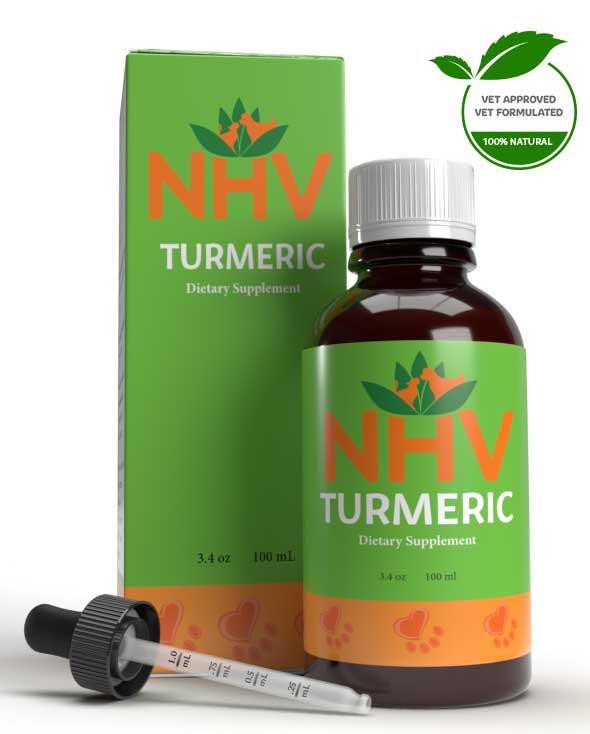
free shipping over $100 (USA & Canada)
1-877-937-4372 the pet expert hotline
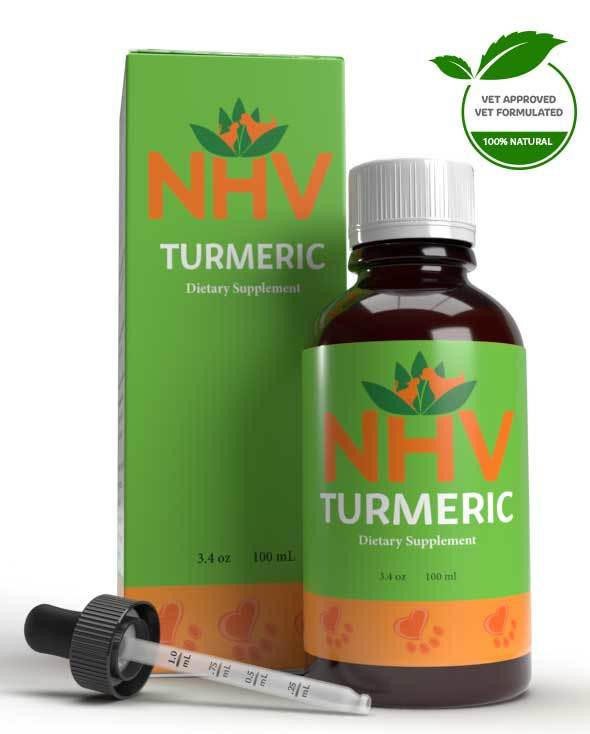

You may have heard different stories like pets can only see in black and white, a warm nose means the pet has a fever or eczema in pets. To clarify some of these myths surrounding our fur babies, in this blog, I will help pet parents bust 8 common myths in the animal world!
True. Animals see very well in the dark due to a pigmentation in the back of the eyes that amplifies the brightness.
Myth. A wet and cold nose cannot be considered as an indication that your dog is sick. To find out if the animal has a fever, a rectal thermometer needs to be used. Only in this way is it possible to know if the pet has a fever.

Yes! It is increasingly common for dogs to be part of the family and participate in our daily lives. They wait all day until their owner comes home from work or a walk and greet them as happy as if they had been away for days. As such, your dog expects you, his or her owner to arrive with the same energy as usual. If the intensity of interaction is not the same, they feel that something is wrong and may end up getting depressed as well.
Truth. Spaying in female dogs is indicated before the first heat. This prevents hormonal changes from occurring by preventing the appearance of mammary and uterine tumors.
There is a condition named military dermatitis that affects cats and which some people call eczema in cats. However, it not exactly eczema. It is a skin condition in cats that most commonly results from an allergic reaction. Fun fact: similarly to humans, sheep also have facial eczema, a condition known as mycotoxin disease.
From the animal health and welfare standpoint, sterilization is beneficial for males and females’ dogs and cats, lowering the risk of breast, testicular and prostate tumors and urinary tract infections. They do not need to have a litter first.
True. Sometimes when your cat is presenting intestinal problems it could mean that they have Lymphoma Alimentary (gastrointestinal). As the alimentary form of lymphoma can affect any portion of the stomach or intestines, symptoms signs such as weight loss, lethargy, loss of appetite, vomiting, and diarrhea, can be confused with IBD.
NHV has many supplements that can support some of these conditions discussed before. For example:
Turmeric has anti-inflammatory properties that can be helpful to decrease the temperature in a pet with fever.
As it is an disease caused by the immune system, Stimmune and Felimm can be a good option for supporting the immune system.
Felimm helps to balance the immune system that is dysregulated in an animal with Lymphoma.
Felimm: This formula helps to balance the immune system that is dysregulated in an animal with Lymphoma. It also helps fight against Feline Leukemia (FeLV) that is related to Lymphoma, and the Feline Immunodeficiency Virus (FIV), Feline Infectious Peritonitis (FIP), canine herpesvirus, and parvovirus. In addition, it helps fight infections, encourages detoxication of the lymphatic system, stimulates the appetite, improves energy levels and helps combat upper respiratory tract infections.
Milk Thistle: Unfortunately, chemotherapy has many side effects, such as toxicity of the organs. Milk Thistle can be very helpful to prevent and decrease these toxicities. As it can detoxify the liver and kidney by removing toxins that can build up in a pet`s system when taking pharmaceutical or from chemical-laden foods. Improves liver and kidney function, supports regeneration of the liver, and supports overworked kidney. Also has antioxidant properties and may benefit as an anticancer support.
Yucca: As corticosteroids are often used in the treatment of lymphoma and Yucca contain steroidal saponins, it can be very useful for pets suffering Alimentary Lymphoma. This is well researched and reported that these steroidal saponins present in Yucca stimulates the body to produce its own natural corticosteroids. Our Yucca is formulated and dosed specifically to be safe for long term use in pets. It has been used successfully.
Plantaeris: It helps maintain normal bowel functions, soothes and relives spasms of the digestive tract and reduces discomfort and discomfort of the pet suffering from Alimentary Lymphoma.
Also, the diet is very important, you can check the tips here to learn more about what you should feed your pet with cancer.
arthritis support

Support for Arthritis and Cancer
buy 2 and save $3
3 month supply for a small to medium size
From their tails to their whiskers, a cat’s body needs to be able to fight whatever comes their way - and not just the toys they like to chase, but health concerns too. NHV Turmeric for cats can be given to your furkiddos for a little extra TLC. This super herb offers support for a variety of conditions like cardiovascular issues, skin health, liver and kidney disease, arthritis, and overall well-being.
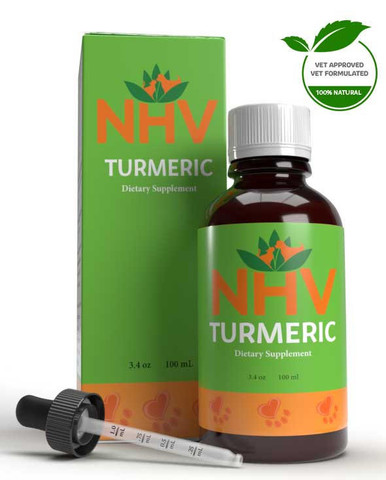
From their tails to their whiskers, a cat’s body needs to be able to fight whatever comes their way - and not just the toys they like to chase, but health concerns too. NHV Turmeric for cats can be given to your furkiddos for a little extra TLC. This super herb offers support for a variety of conditions like cardiovascular issues, skin health, liver and kidney disease, arthritis, and overall well-being.
Want to get your feline friend on a wellness-promoting supplement? Turmeric is an excellent choice - it’s well-tolerated by our whiskered furkiddos, and can offer them many benefits!
What goes into your cat’s body every day will make a difference when it is time to fight a disease, or when they already have one. That’s why NHV supplements are designed to be given each and every day for things like:
It can even be used proactively before your furry friend becomes sick in the first place by giving them a regular boost of natural goodness!
Turmeric itself is a root with vibrant orange-golden flesh. It’s golden in the world of herbalism for pets with its many healing properties.
One of turmeric’s most well-recognized healing properties is its antioxidant content. Antioxidants can help scavenge for free radicals, which are unstable molecules that cause damage to the cells. The free radical scavenging properties of turmeric can support the body in processing and removing these molecules, minimizing the damage they can do.
At NHV, we are experts at harnessing the benefits of herbal ingredients specifically for your pets. When you choose NHV Turmeric, you’re choosing decades of holistic pet wellness experience from vets and herbalists. Our formula is:
We are proud to have been a part of many cats’ success stories over the decades. Check out this feline friend of ours, Willow, who has used our Turmeric for cats formula for comfort and wellness.
Willow’s Story: “I have no doubt that the supplements from NHV have been a huge part in maintaining her health and staving off the cancer that was found in late 2021”
Holistic Veterinarian Approves of Using Turmeric for Cats
Dr. Hillary, a holistic vet, writes an in-depth overview of Turmeric and why she believes turmeric can play a beneficial role in pet health. Read Dr. Hillary’s Turmeric overview here.
All NHV supplements are made with the finest quality organic or ethically harvested herbs. We use non-GMO vegetable glycerin as our base. NHV products are full-spectrum extracts.
Select your pet's weight to determine the correct dose.
To be taken twice daily. Determine your pet’s weight and then use the easy chart below to determine the correct dose. This is the minimum dosage.
Pet's Weight Dosage
0 - 15 lb = 0.5 ml
16 - 30 lb = 1.0 ml
31 - 45 lb = 1.5 ml
46 - 60 lb = 2.0 ml
61 - 75 lb = 2.5 ml
Over 75 lb = 3.0 ml
How to Administer
Shake well before use. The easiest method is to use the dropper provide and places the drops into your pet’s food or favorite treat. You can also use the dropper and squirt directly into the pet’s mouth.
Some pets can be finicky, if this occurs consider hiding the drops in foods most pet’s love such as fish, chicken or yogurt or a favourite treat. If your pet only eats dry food then soak a few kibbles at feeding time.
For Best Results
Herbal dietary supplements are beneficial to the health and wellbeing of your pet and are safe for long-term use. Every pet responds to natural herbal supplements differently, therefore it is important to be consistent and administer the product daily. Supplements generally take two to four weeks to take effect, however this will vary from one animal to the next.
Product Storage
All NHV Natural Pet Products are pure herbal extracts and contain no artificial additives, preservatives or coloring. Shelf life after opening is 6 months and must be refrigerated after opening.
Cautions and Contraindications: Do not use Turmeric in pregnant or nursing animals. Speak to your vet before using our products. A second visit is recommended if your pet’s condition does not improve, or deteriorates after continued use of the supplements.
Want to get your feline friend on a wellness-promoting supplement? Turmeric is an excellent choice - it’s well-tolerated by our whiskered furkiddos, and can offer them many benefits!
What goes into your cat’s body every day will make a difference when it is time to fight a disease, or when they already have one. That’s why NHV supplements are designed to be given each and every day for things like:
It can even be used proactively before your furry friend becomes sick in the first place by giving them a regular boost of natural goodness!
Turmeric itself is a root with vibrant orange-golden flesh. It’s golden in the world of herbalism for pets with its many healing properties.
One of turmeric’s most well-recognized healing properties is its antioxidant content. Antioxidants can help scavenge for free radicals, which are unstable molecules that cause damage to the cells. The free radical scavenging properties of turmeric can support the body in processing and removing these molecules, minimizing the damage they can do.
At NHV, we are experts at harnessing the benefits of herbal ingredients specifically for your pets. When you choose NHV Turmeric, you’re choosing decades of holistic pet wellness experience from vets and herbalists. Our formula is:
We are proud to have been a part of many cats’ success stories over the decades. Check out this feline friend of ours, Willow, who has used our Turmeric for cats formula for comfort and wellness.
Willow’s Story: “I have no doubt that the supplements from NHV have been a huge part in maintaining her health and staving off the cancer that was found in late 2021”
Holistic Veterinarian Approves of Using Turmeric for Cats
Dr. Hillary, a holistic vet, writes an in-depth overview of Turmeric and why she believes turmeric can play a beneficial role in pet health. Read Dr. Hillary’s Turmeric overview here.
All NHV supplements are made with the finest quality organic or ethically harvested herbs. We use non-GMO vegetable glycerin as our base. NHV products are full-spectrum extracts.
Select your pet's weight to determine the correct dose.
To be taken twice daily. Determine your pet’s weight and then use the easy chart below to determine the correct dose. This is the minimum dosage.
Pet's Weight Dosage
0 - 15 lb = 0.5 ml
16 - 30 lb = 1.0 ml
31 - 45 lb = 1.5 ml
46 - 60 lb = 2.0 ml
61 - 75 lb = 2.5 ml
Over 75 lb = 3.0 ml
How to Administer
Shake well before use. The easiest method is to use the dropper provide and places the drops into your pet’s food or favorite treat. You can also use the dropper and squirt directly into the pet’s mouth.
Some pets can be finicky, if this occurs consider hiding the drops in foods most pet’s love such as fish, chicken or yogurt or a favourite treat. If your pet only eats dry food then soak a few kibbles at feeding time.
For Best Results
Herbal dietary supplements are beneficial to the health and wellbeing of your pet and are safe for long-term use. Every pet responds to natural herbal supplements differently, therefore it is important to be consistent and administer the product daily. Supplements generally take two to four weeks to take effect, however this will vary from one animal to the next.
Product Storage
All NHV Natural Pet Products are pure herbal extracts and contain no artificial additives, preservatives or coloring. Shelf life after opening is 6 months and must be refrigerated after opening.
Cautions and Contraindications: Do not use Turmeric in pregnant or nursing animals. Speak to your vet before using our products. A second visit is recommended if your pet’s condition does not improve, or deteriorates after continued use of the supplements.
immune & allergy support
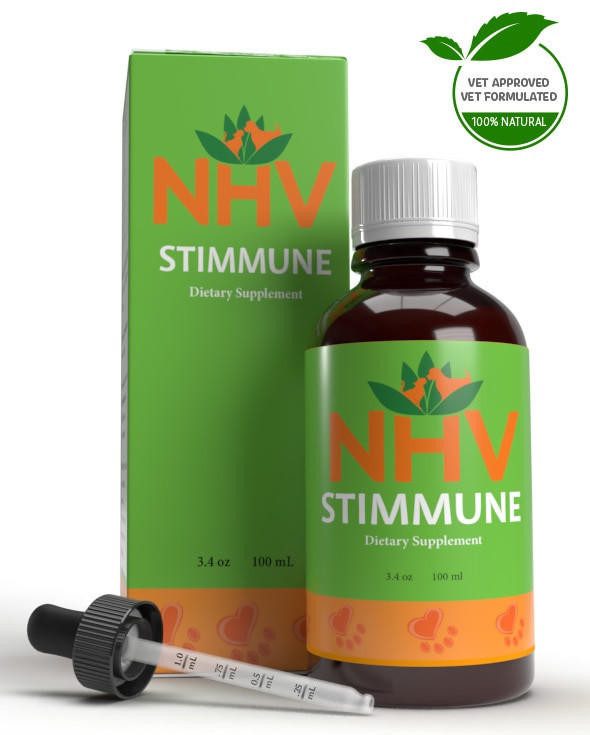
Holistic Remedy for Food Allergies and Immune Support in Cats
buy 2 and save $3
3 month supply for a small to medium size
Helps your cat overcome food allergies, skin allergies, and fight infection.

Helps your cat overcome food allergies, skin allergies, and fight infection.
Cats can be allergic to the things they eat and touch, just like people can. With NHV’s Stimmune, your kitty will get potent immune supporting herbs that help support your cat with food allergy reactions, as well as reactions related to fleas, dermatitis, insect bites, diet, and exposure to chemicals and drugs. For seasonal or environmental allergies, please try Alge-Ex for a remedy specifically formulated for your cat.
At NHV, all of our pet products are formulated by a master herbalist as well as a holistic veterinarian having more than 20 years of experience. Some ingredients are even wild-crafted which means they were ethically harvested from their natural environment. Our products are also safe for long-term use and are supplements that animals like to take, including finicky kitties.
If you have questions about holistic remedies for cat allergies to food or any of our wide variety of products, you can ask an NHV expert. Our very supportive professional team of pet experts are here to help and recommend supplements because, at NHV, we want your kitty feeling pawtastic naturally!
Stimmune Is Also Helpful for:
Cats can get food allergies from their diet, and other allergies from their environment when allergens are inhaled, ingested, or absorbed by the body. Once this happens, the immune system overreacts, and this is when your kitty will need extra balance and support.
Read about a senior cat’s Helenda’s transformation using Stimmune.
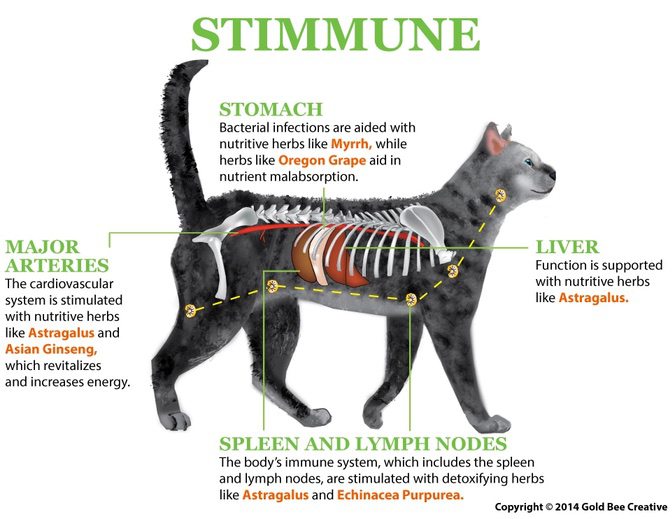
How NHV’s Stimmune Helps Allergies in Cats
Stimmune promotes healthy immune activity and histamine response with five natural herbs formulated to reduce environmental allergies in cats.
Stimmune provides support in addition to conventional treatment for all forms of allergies including pollen allergies in cats.
Select your pet's weight to determine the correct dose.
Cats can be allergic to the things they eat and touch, just like people can. With NHV’s Stimmune, your kitty will get potent immune supporting herbs that help support your cat with food allergy reactions, as well as reactions related to fleas, dermatitis, insect bites, diet, and exposure to chemicals and drugs. For seasonal or environmental allergies, please try Alge-Ex for a remedy specifically formulated for your cat.
At NHV, all of our pet products are formulated by a master herbalist as well as a holistic veterinarian having more than 20 years of experience. Some ingredients are even wild-crafted which means they were ethically harvested from their natural environment. Our products are also safe for long-term use and are supplements that animals like to take, including finicky kitties.
If you have questions about holistic remedies for cat allergies to food or any of our wide variety of products, you can ask an NHV expert. Our very supportive professional team of pet experts are here to help and recommend supplements because, at NHV, we want your kitty feeling pawtastic naturally!
Stimmune Is Also Helpful for:
Cats can get food allergies from their diet, and other allergies from their environment when allergens are inhaled, ingested, or absorbed by the body. Once this happens, the immune system overreacts, and this is when your kitty will need extra balance and support.
Read about a senior cat’s Helenda’s transformation using Stimmune.

How NHV’s Stimmune Helps Allergies in Cats
Stimmune promotes healthy immune activity and histamine response with five natural herbs formulated to reduce environmental allergies in cats.
Stimmune provides support in addition to conventional treatment for all forms of allergies including pollen allergies in cats.
Select your pet's weight to determine the correct dose.
immune & allergy support
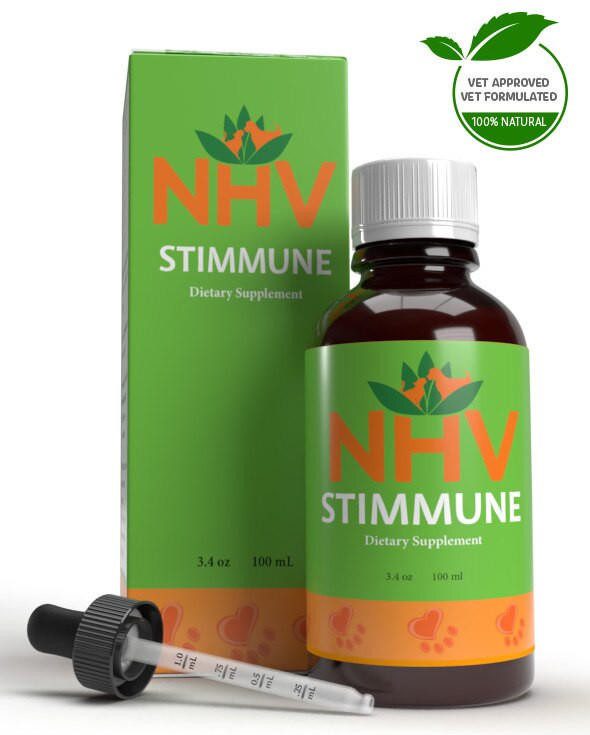
Natural Dog Food Allergy Supplement and Immune Support.
buy 2 and save $3
3 month supply for a small to medium size
Soothes food allergies, skin allergies (dermatitis), and infection. Helps relieve a variety of symptoms related to allergies. Supports a healthy balance of the immune system in pets with conditions such as autoimmune disease.

Soothes food allergies, skin allergies (dermatitis), and infection. Helps relieve a variety of symptoms related to allergies. Supports a healthy balance of the immune system in pets with conditions such as autoimmune disease.
Stimmune helps balance the immune system and helps ease allergy symptoms that can make your dog miserable. Stimmune is an all-natural, vet-formulated dog allergy immune supplement that will help your pet deal with dog food allergies as well as other immune related disorders.
Stimmune can provide dog allergy help with allergic reactions related to food, as well as environmental allergies including reactions to fleas, insect bites, food and other environmental factors. For more acute seasonal or environmental allergies, please try Alge-Ex for a remedy specifically formulated for your dog.
An allergy is an overreaction of the immune system to a normally harmless substance called an antigen. Allergies in dogs often occur when allergens are inhaled, ingested, or absorbed by the body. When this occurs, the immune system becomes over-reactive to substances it believes are harmful. This reaction causes a release of histamine, causing the common allergy symptoms in your pet.
The cause of allergies in dogs can be difficult to determine. While it is always best to eliminate the cause altogether, like omitting a specific food from their diet, some causes can be nearly impossible to totally eradicate, like dust mites or pollen. This is where a dog allergy supplement that is taken daily can help relieve your loved one of common allergens, even when you're not exactly sure what they are allergic to.
Dog food allergy support is close at hand with Stimmune added into your pet’s daily regimen. This 100% natural herbal supplement was formulated by a holistic veterinarian to comprehensively care for your pet’s health.
Explore our Pet Expert Q&A to ask questions about your pet’s allergic reactions or view questions that other concerned pet owners like you have posted. Or, visit our blog to learn how to prevent food allergies in dogs and cats.
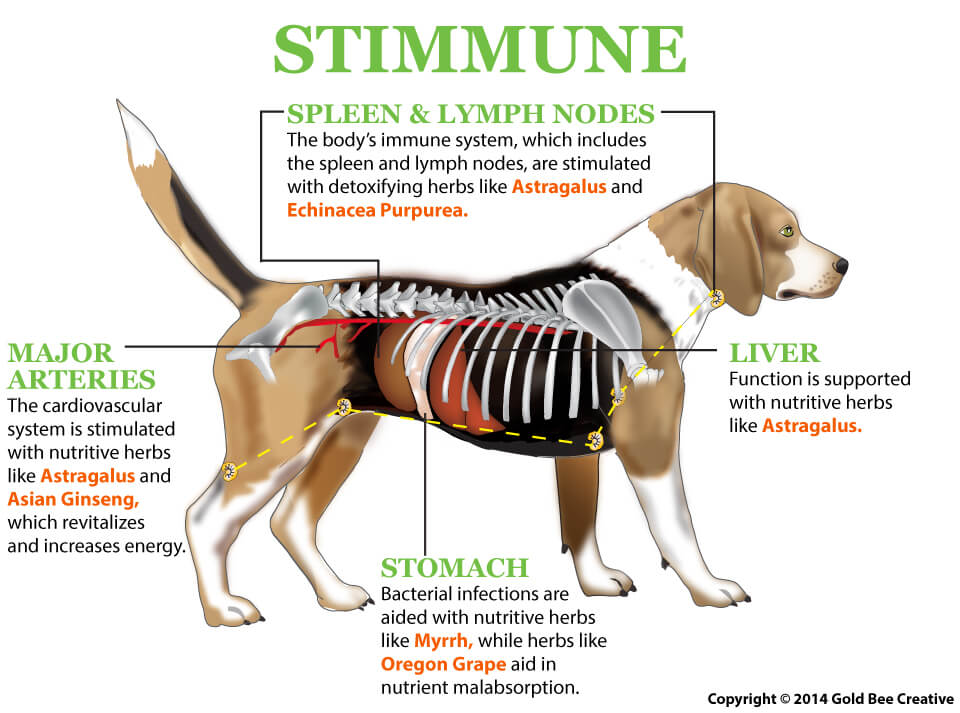
Astragalus – Stimulates liver function and helps balance the immune system. High in antioxidants it also helps protect against oxidative damage.
Echinacea Purpurea – Reduces inflammation, helps boost the immune system and efficiently fights infection.
Oregon Grape – Has antibiotic, anti-inflammatory and immunostimulatory properties.
Asian Ginseng – Has been used for thousands of years to help against various health issues. This antioxidant herb helps balance the immune system, helps the body fight infections and helps the body cope against stress.
Myrrh – An astringent that relieves irritated skin, Myrrh is high in anti-inflammatory and antioxidant effects.
Select your pet's weight to determine the correct dose.
To be taken twice daily. Determine your pet’s weight and then use the easy chart below to determine the correct dose. This is the minimum dosage.
Pet's Weight Dosage
0 - 15 lb = 0.5 ml
16 - 30 lb = 1.0 ml
31 - 45 lb = 1.5 ml
46 - 60 lb = 2.0 ml
61 - 75 lb = 2.5 ml
Over 75 lb = 3.0 ml
For small animals (rabbits, ferrets), avians and reptiles use 1 drop for every 2 lb of body weight.
How to Administer
Shake well before use. The easiest method is to use the dropper provide and places the drops into your pet’s food or favorite treat. You can also use the dropper and squirt directly into the pet’s mouth.
Some pets can be finicky, if this occurs consider hiding the drops in foods most pet’s love such as fish, chicken or yogurt or a favorite treat. If your pet only eats dry food then soak a few kibbles at feeding time.
For Best Results
Herbal dietary supplements are beneficial to the health and wellbeing of your pet and are safe for long-term use. Every pet responds to natural herbal supplements differently, therefore it is important to be consistent and administer the product daily. Supplements generally take two to four weeks to take effect, however this will vary from one animal to the next.
Product Storage
All NHV Natural Pet Products are pure herbal extracts and contain no artificial additives, preservatives or coloring. Shelf life after opening is 6 months and must be refrigerated after opening.
Cautions and Contraindications
Do not use Stimmune in pregnant or nursing animals. Speak to your vet before using our products. A second visit is recommended if your pet’s condition does not improve, or deteriorates after continued use of the supplements.
All information provided by NHV Natural Pet Products is for educational purposes only.
Stimmune helps balance the immune system and helps ease allergy symptoms that can make your dog miserable. Stimmune is an all-natural, vet-formulated dog allergy immune supplement that will help your pet deal with dog food allergies as well as other immune related disorders.
Stimmune can provide dog allergy help with allergic reactions related to food, as well as environmental allergies including reactions to fleas, insect bites, food and other environmental factors. For more acute seasonal or environmental allergies, please try Alge-Ex for a remedy specifically formulated for your dog.
An allergy is an overreaction of the immune system to a normally harmless substance called an antigen. Allergies in dogs often occur when allergens are inhaled, ingested, or absorbed by the body. When this occurs, the immune system becomes over-reactive to substances it believes are harmful. This reaction causes a release of histamine, causing the common allergy symptoms in your pet.
The cause of allergies in dogs can be difficult to determine. While it is always best to eliminate the cause altogether, like omitting a specific food from their diet, some causes can be nearly impossible to totally eradicate, like dust mites or pollen. This is where a dog allergy supplement that is taken daily can help relieve your loved one of common allergens, even when you're not exactly sure what they are allergic to.
Dog food allergy support is close at hand with Stimmune added into your pet’s daily regimen. This 100% natural herbal supplement was formulated by a holistic veterinarian to comprehensively care for your pet’s health.
Explore our Pet Expert Q&A to ask questions about your pet’s allergic reactions or view questions that other concerned pet owners like you have posted. Or, visit our blog to learn how to prevent food allergies in dogs and cats.

Astragalus – Stimulates liver function and helps balance the immune system. High in antioxidants it also helps protect against oxidative damage.
Echinacea Purpurea – Reduces inflammation, helps boost the immune system and efficiently fights infection.
Oregon Grape – Has antibiotic, anti-inflammatory and immunostimulatory properties.
Asian Ginseng – Has been used for thousands of years to help against various health issues. This antioxidant herb helps balance the immune system, helps the body fight infections and helps the body cope against stress.
Myrrh – An astringent that relieves irritated skin, Myrrh is high in anti-inflammatory and antioxidant effects.
Select your pet's weight to determine the correct dose.
To be taken twice daily. Determine your pet’s weight and then use the easy chart below to determine the correct dose. This is the minimum dosage.
Pet's Weight Dosage
0 - 15 lb = 0.5 ml
16 - 30 lb = 1.0 ml
31 - 45 lb = 1.5 ml
46 - 60 lb = 2.0 ml
61 - 75 lb = 2.5 ml
Over 75 lb = 3.0 ml
For small animals (rabbits, ferrets), avians and reptiles use 1 drop for every 2 lb of body weight.
How to Administer
Shake well before use. The easiest method is to use the dropper provide and places the drops into your pet’s food or favorite treat. You can also use the dropper and squirt directly into the pet’s mouth.
Some pets can be finicky, if this occurs consider hiding the drops in foods most pet’s love such as fish, chicken or yogurt or a favorite treat. If your pet only eats dry food then soak a few kibbles at feeding time.
For Best Results
Herbal dietary supplements are beneficial to the health and wellbeing of your pet and are safe for long-term use. Every pet responds to natural herbal supplements differently, therefore it is important to be consistent and administer the product daily. Supplements generally take two to four weeks to take effect, however this will vary from one animal to the next.
Product Storage
All NHV Natural Pet Products are pure herbal extracts and contain no artificial additives, preservatives or coloring. Shelf life after opening is 6 months and must be refrigerated after opening.
Cautions and Contraindications
Do not use Stimmune in pregnant or nursing animals. Speak to your vet before using our products. A second visit is recommended if your pet’s condition does not improve, or deteriorates after continued use of the supplements.
All information provided by NHV Natural Pet Products is for educational purposes only.
Published: December 13, 2019